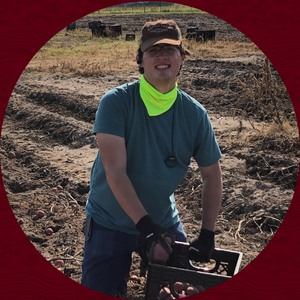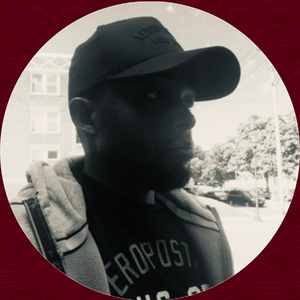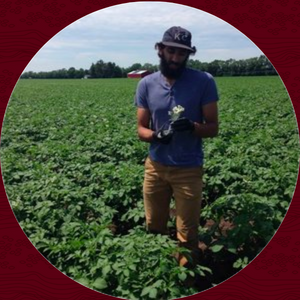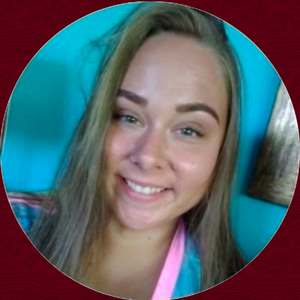
Michael Miller
Applied Plant Science - Plant Breeding
Undergraduate Degree: Plant Science - Plant Breeding Track, University of Minnesota
What made you decide to get a graduate degree in the plant sciences? And what are you currently working on?
I want to help meet the nutritional needs of the world’s growing population, and I enjoy the mix of fieldwork and desk work. Currently, I’m creating a program to measure potato traits like shape, size, and color from pictures. This will help potato breeders have more objective data to use in their selection process.
What is the best part of being in the Shannon Lab?
Potato breeding is at an exciting point where new techniques and methods are being created all the time and I get to be a part of that.
So far, what has been your favorite memory?
Making full use of my college degree to fry chips and french fries - for scientific purposes.
Do you have any advice for undergraduates?
Work in a lab studying plants. It is the best way to learn about plant science and can help you see the “big picture” of how different topics fit together.

Muyideen Yusuf
Applied Plant Sciences - Plant Breeding
Undergraduate Degree: Crop Science, Abubakar Tafawa Balewa University(ATBU), Nigeria
What made you decide to get a graduate degree in the plant sciences?
I’m interested in the process of studying nature for the purpose of man and the ability to artificially manipulate it to satisfy human needs.
What are you currently working on?
I am working on breeding potatoes as a diploid crop instead of tetraploid. This can facilitate the early development of new, disease-free, and high-yielding varieties.
What is the best part of being in the Shannon Lab?
The best part is growing potatoes in the field and getting to use methods such as molecular and computational tools.
Do you have any advice for new graduate students?
Take research work more seriously and seek help whenever necessary.

Husain Agha
Plant and Microbial Biology
Undergraduate Degree: Classical Humanities, University of Missouri
What made you decide to get a graduate degree in the plant sciences?
I became interested in plant sciences when I was conducting research on maize as an undergrad.
What are you currently working on?
I’m studying the effects of ploidy on potato population genetics and demography.
What is the best part of being in the Shannon Lab?
Dr. Shannon! She’s an amazing mentor and she makes grad school so much easier.
Do you have any advice for undergrads?
Don’t be afraid to reach out early about working in labs. You often don’t need experience to get the job. And make sure the work is paid - If the work is worth your time, you should be getting paid to do it, undergrad or grad. And always ask questions - this is your degree. Don’t let answers like “it’s tradition” or “that’s how it’s always been” be an acceptable answer.

Heather Tuttle
Biomedical Informatics and Computational Biology
Undergraduate Degree: Life science, University of Minnesota
What made you decide to get a graduate degree in the plant sciences? And what are you currently working on?
I was really interested in the projects I was doing in the Shannon lab during my undergraduate degree, so I decided to continue it! Currently, I’m running an RNA experiment and doing an analysis with a diversity panel. I’m also working on an algorithm that uses reduced representation sequencing data to determine ploidy.
What is the best part of being in the Shannon Lab?
Getting to research a tuber that everyone loves (more than sweet potato) is undoubtedly the best part! Also, I like the heavy work that planting and harvest can bring.
Do you have any advice for undergrads?
Start reading scientific literature as soon as possible and get used to the jargon in the discipline that interests you the most.
How about advice for new graduate students?
Making progress is the goal, so don’t just celebrate the big items, but also your day-to-day accomplishments.

Nicole Mihelich
Applied Plant Science - Plant Breeding/Molecular Genetics
Undergraduate: Biochemistry with a certificate in Environmental Studies, University of Wisconsin-Madison
What made you decide to get a graduate degree in the plant sciences?
I explored several different research labs as an undergrad, but in all of these experiences, I found it most exciting to focus on plants and work toward improving them for a better future for humans and the environment.
What are you currently working on as a graduate student?
With co-advisors in potato breeding (Laura Shannon) and turfgrass breeding (Eric Watkins), I am working toward improving the understudied fine fescue grass species as a low-input turfgrass, specifically for sod production. Similarly to fine fescues, potato has varying ploidy levels. The expertise of the Shannon lab has helped me to tackle the challenges of studying polyploids to increase my understanding of fine fescue genomics and diversity for more effective breeding.
How does being in two labs work?
It’s busy but rewarding! Since my research intersects two labs, each experience helps me gain insights and ideas on my own work. I sometimes mentor students, too, which allows for interesting comparisons of similar techniques between potato and turf, like flow cytometry.
What is the best part of being in the Shannon Lab?
We have a great team spirit and communication that fosters an environment where everyone can be themselves and work toward collective goals, while also having fun in the process.
Advice for new graduate students?
A good relationship with your advisor is key to a positive and successful graduate program. Talk to other graduate students and researchers about their research, their experiences, their career plans, their lives; you will learn so much and can gain excellent colleagues for the rest of your career! If you have a problem or are looking to learn something, don’t be afraid to ask around and talk it out. There are so many amazing people with all kinds of expertise that are happy to help! Grad school is a marathon; pace yourself and be intentional about each day.
